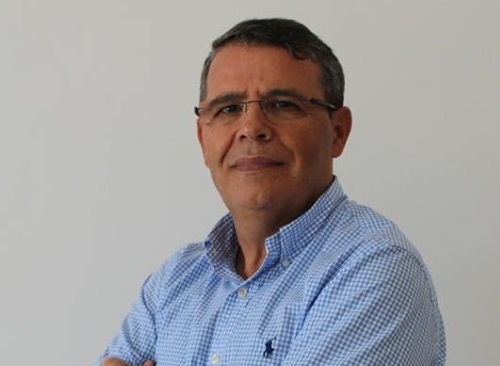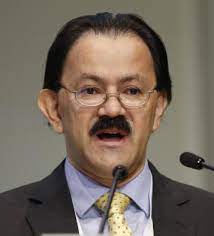The ninth edition of the report THE OUTLOOK FOR AGRICULTURE AND RURAL DEVELOPMENT IN THE AMERICAS: A Perspective on Latin America and the Caribbean has been launched an it is the result of a joint effort by the Economic Commission for Latin America and the Caribbean (ECLAC), the Food and Agriculture Organization of the United Nations (FAO) and the Inter-American Institute for Cooperation on Agriculture (IICA).
The editorial coordination of this publication was in charge of Joaquín Arias (IICA) and was co-led by Adrián Rodríguez from ECLAC and Luiz Beduschi from FAO.
We must recognize the 30 technicians from the three institutions who participated actively making contributions to the development of the various topics discussed in this report. The special chapter that this year dealt with digitization in agriculture, promoting and accelerating digital transformation in the post-pandemic period, was led by Federico Bert from IICA.
The report, through an interdisciplinary, comprehensive and intensive approach in the use of statistics and evidence, highlights the central role of agri-food systems and the actions necessary for the rural and agricultural transformation of Latin America and the Caribbean in the post-pandemic recovery scenario of COVID-19.
The following are the most outstanding messages from the directors of ECLAC, FAO and IICA at the launch of the report during the 2021 Conference of Ministers of Agriculture of the Americas and the Twenty-First Regular Meeting of the Inter-American Board of Agriculture (IABA).
GLOBAL AND REGIONAL CONTEXT
We had the privilege of transmitting the prerecorded presentation of Ms. Alicia Bárcena, ECLAC executive secretary, who spoke to us about the global and regional context, chapter two of the report, marked by the pandemic caused by COVID-19, which has affected Latin America and the Caribbean more than any other region in the world, both in health and economic terms.
|
Chapter 2, on the global and regional context, highlights the priorities for agri-food systems (AFSs) in the coming years should include investing in green infrastructure to help mitigate climate change, promoting universal access to social security, introducing initiatives to boost productive capacity and to adapt to the digitalized economy, and solving the over-indebtedness of families and productive farms. |
Here are the most important messages from Ms. Bárcena's speech:
- The unprecedented impacts of the COVID-19 pandemic in our region have made analysis of our agri-food systems more relevant than ever.
- By mid-august, the region accumulated nearly 1.4 million deaths attributable to COVID-19, 32% of the global total even as regional population is just 8.4% of the global total.
|
The pandemic has shown food systems to be central to maintaining global, regional, and national food flows from our fields to our populations, especially when confined by quarantine and mobility restrictions. |
- It has also revealed underlying vulnerabilities. In 2020 Latin America and the Caribbean suffered from a 6.8% drop in GDP -the worst contraction in economic activity in 120 years. ECLAC estimates regional growth at 5.8% in 2021 and a deceleration to 2.9% growth in 2022. There is no reason to expect the low-growth dynamics that dominated the pre-2020 years to change thereafter. Indeed, the social imbalances and the region’s structural problems have been exacerbated greatly by the crisis and will persist throughout the recuperation. Essentially, we must talk about a “recovery paradox”.
- The pandemic-derived crisis has increased inequality and poverty with an extreme impact on women, school-aged children, and the elderly. Fiscal measures adopted by countries have been important, but insufficient in terms of amount and duration. In the last year, the rates of extreme poverty and poverty reached 12.5% and 33.7%, respectively. The emergency transfers to the most vulnerable sectors limited increases in poverty. These emergency transfers benefitted 326 million people, or 49.4% of the population. Still, income inequality in the region increased.
- The regional unemployment rate stood at 10.7% at the end of 2020 with an increase of 2.6 percent points with respect to the value registered in 2019. The strongest impact has been on informal employment. Furthermore, unjust social organization of care and the lack of support during the pandemic represent a ten-year setback in women’s labor insertion. Occupation in the agricultural sector, where informality reaches over 80%, has been strongly affected, and especially the employment of migrants.
- The impact of the COVID-19 pandemic on employment has caused a reduction in household income. An increase in hunger and other forms of food insecurity and malnutrition is a consequence. Moderate or severe food insecurity reached 40.4% of the population in 2020.
|
In this context, the agricultural sector has shown great resilience in the face of the decline in general economic activity. Preliminary data indicate that the sector grew and decreased less than overall GDP in 2020 in most regional countries. The sector has responded well thus far to health, logistical and financial challenges. |
- For consumers, the news is less encouraging. Regionally, food price indices have grown at higher rates than the overall price index. In June 2021, the regional weighted average food price index grew 7.8% year-on-year while the general price index grew 5.7% over the same period.
- The increase in poverty and food prices accentuate a problem that has been worsening in the region, which we call “the double burden of malnutrition”. That is, the simultaneous occurrence of undernourishment along with obesity.
|
ECLA estimates that the economic cost of the “double burden” can rise to values above 10% of GDP in some countries. |
- Face with this scenario, we have established the need to connect the emergency with recovery and a decade of action to face the planet’s main challenges. In other words, building a new future: a transformative recovery with equality and sustainability.
- This crisis creates a sense of urgency that we must take advantage of to create more robust, inclusive, sustainable, and competitive agri-food systems. To do so:
- We need to enhance our role as a region that provides food for the world, without affecting our biodiversity and fragile ecosystems.
- We need to move towards more agroecological production systems and practices, the application of nature-based solutions, and the development of the bioeconomy.
- We must also make better use of our rich endowments in agrobiodiversity, cultural diversity, and ancestral knowledge
- We need to promote healthier lifestyles.
- And we must create synergies and complementarities in various areas:
- Between ancestral knowledge and modern scientific knowledge.
- Between digital technologies and the life sciences.
- Between production for export and for local markets.
- Between global trade and intraregional food trade.
|
Given its essential nature, food production, together with the health sector should be at the forefront of financing and investment priorities for the post-pandemic recovery and transformation phase. |
RURAL AND AGRICULTURAL TRANSFORMATION
Next, we had the honor of listening to the pre-recorded presentation of Mr. Julio Berdegué, FAO Regional Director, who presented the third chapter of the joint report, focused on agricultural transformation in the face of the challenges and opportunities of the post-pandemic scenario.
|
Chapter 3,on rural and agricultural transformation, remarks that the post-COVID-19 pandemic transition is an opportunity to promote a more sustainable, inclusive and resilient rural and agricultural transformation. This requires innovative actions in various fields and new relationships between public, private and civil society actors. |
Here are the most prominent messages from Mr. Berdegué's speech:
- Latin America and the Caribbean is a prodigious land because of its food production capacity. We are lucky to have 17 million farmers and 2 million fishermen, being the vast majority of them small-scale family producers. They have managed to turn our lavish nature into food for the world; not only for the inhabitants of the region, but for the world.
- So why is it necessary to think about the transformation of these agri-food systems? Due to reasons from the past and the future. Half of the rural population is living in poverty. 60 million inhabitants in the region are suffering from hunger. A third of our soils are degraded, and half of our fisheries are overexploited. Although it is not true that all deforestation is a consequence of agriculture, it is true that an important part is.
- Regarding the future, I listen with joy when some farmers tell me proudly that they are the third, the fourth or the fifth generation in the field. However, unlike their parents and grandparents, today's farmers must produce on a planet with climate change. And their children and grandchildren, who we want to continue to be farmers, will face this condition more severely if we don't take action today. Let’s add in the rapid changes brought about by technology, by advanced biology integrated into data science. What is modern today will be replaced tomorrow by new alternatives, by new ways of producing, processing, selling and buying, and consuming food. Let's think of a young person today, 15 years old. Imagine that boy or girl, 20 years from now, when he or she and their entire generation constitute the majority of the consumers to whom the new farmers will direct the food of this land..
- What is that consumer going to demand? What is he or she going to ask not only of the product itself, but about the way it was produced? What will that market be like with those consumers who are currently young teenagers? Does anyone think that agri-food systems, in 15 or 20 years, are going to be the same as the ones we have today? That is why the transformation must begin now. It is true that, among the multiple agri-food systems that exist in each rural space in this region, not all the forms or customs from all de dimensions have to change. It is true that, in many cases, the best response to climate change or the obesity epidemic caused by poor diet, or hunger, is to preserve rather than transform.
But change is the sign of the times.
- The transformation won’t be a "big bang", where everything changes from one day to the next, nor will it be a single, centrally planned, unified process. Nobody is looking for, or wanting, or proposing that. The transformation will be the sum of countless partial and decentralized transitions, each of them with an autonomous origin. These transitions will have their national and local hallmarks, because all the countries and all the numerous forms of agriculture that co-exist in this region are special. Each one is unique, as well as the ways they change. Some changes will be very deep, others not so much, but over time, in 10, 20, or 50 years, the agri-food systems of our grandchildren will be markedly different from those of today.
|
Agriculture did not fail in the pandemic; every day, food continued to reach the markets. But the pandemic has made visible some weak points in the global and regional agri-food system, and we should not wait for the next crisis to remember them. It is necessary to correct and reinforce them now. |
- Compared to other regions of the planet, Latin America and the Caribbean has great advantages in this new world of agri-food systems. There are threats, certainly, but also vast opportunities, which are within the reach of the farmers and agro-industrialists for whom, you, ministers work for every day.
|
This is and will continue to be a process where the winners will be those with the greatest capacity for innovation, anticipating the facts, discovering and amplifying new solutions and new ways of producing, processing, trading, buying and selling, and consuming food. |
DIGITALIZATION OF AGRICULTURE
Last but not least, we had a presentation by Mr. Manuel Otero, IICA Director General, who focused his reflections on the special chapter of the Joint Report that this year addressed the issue of the digitization of agriculture as a means to promote and accelerate the recovery and post-pandemic transformation of agri-food systems.
|
The special chapter of the report highlights that the digital transformation of agriculture could make a significant contribution to achieving sustainable and inclusive agri-food systems (AFSs), for which it is imperative to agree on public and private promotion agendas. |
Here are the most important messages from Mr. Otero's speech:
- I would like to express my recognition of Alicia Bárcena and Julio Berdegué for this joint work between ECLAC, FAO and IICA that culminated in the ninth edition of the Outlook Report, which, among its many merits, is prospective and propositional. I would also like to reiterate what they noted in the sense that, amidst this profound crisis, we are seeing opportunities and challenges that must be transformed into transforming actions that prioritize the most pressing issues and, obviously, we must do this together.
- That is why today, I would like to refer to the topic of digital agriculture as I’m convinced that it can make a substantial contribution to transforming and strengthening the agri-food systems as they evolve toward sustainability and social inclusion. There is no doubt that digital technologies are a concrete alternative to tackle many of the challenges we face today—increased production that is more sustainable and resilient; markets that are more efficient and accessible; safer foods that are more nutritious and traceable; and, of course, more inclusion and a better quality of life for all rural actors. Certainly, digital technologies generate and efficiently process large volumes of data, which strengthens learning, decision-making and operating processes. They also maximize the connection between people and devices, thereby bridging the gap between the rural and urban areas.
- While it is true that the digitalization of agriculture in Latin America and the Caribbean is still emerging, it is picking up speed and will be inevitable, without losing sight of the fact that usage is still low and unequal due to a number of barriers. I would like to mention three of these: the first is a low level of connectivity. Based on studies by IICA, the IDB and Microsoft, we have determined that approximately 60% of our continent’s rural population lacks access to quality connectivity. The second barrier is that the existing skills to be able to take full advantage of the digital technologies are very limited—less than 17% of rural inhabitants have a skill related to digital technology. And the third barrier is the low degree of maturity of some of the technologies available in terms of ease of use and utility, both of which are being worked on today.
- There is no doubt that now is the time to drive and accelerate the digital revolution of the agri-food systems in order to move forward with their transformation in the context of the post-pandemic recovery. To that end, there are minimum conditions on which we must work: the first is to have a long-term, strategic vision based on leadership, political commitment and the integration of policies that, necessarily, are differentiated. The second condition is to enact efficient, inclusive institutional and governance mechanisms to address the interaction of policies across all sectors and to align the actions of different levels of government. For this, it is necessary to promote intersectoral and interinstitutional coordination processes with an emphasis on alliances with civil society and private actors. The third condition is to enable a set of tools that allow us to anticipate, evaluate and address long-term national and cross-border policies. These policies must be based on evidence that serves as a foundation to promote intervention in the sense that they must be effective and support the decision-making that maximizes the results mentioned previously.
It is clear that we need a renewed institutional framework. Here I propose that this is a shortcoming of our policies. According to a study monitored by the OECD, only 17% of the public agricultural budget is earmarked for investments in innovation systems, biosecurity and infrastructure, despite the undeniable high financial and social return. I would like to stress that these institutional transformations are not exclusive to the State, but must also be supranational, with the active involvement of international cooperation and financing organizations, academia, and, of course, the research systems that are essential for generating knowledge on this agriculture that we are determined to transform. Thank you.
SEE FULL REPORT

Joaquin Arias holds a PhD in agricultural economics from Oklahoma State University, United States. He is an international technical specialist from IICA's Center for Strategic Analysis (CAESPA), based in Panama.
 Adrián Rodríguez is PhD. in Agricultural Economics from Pennsylvania State University (Penn State), in the United States, Chief of the Agricultural Development and Biodiversity Unit at ECLAC, Chile.
Adrián Rodríguez is PhD. in Agricultural Economics from Pennsylvania State University (Penn State), in the United States, Chief of the Agricultural Development and Biodiversity Unit at ECLAC, Chile.
 Luiz Beduschi is an Agricultural Engineer, PhD in Environmental Sciences, Policy Officer in Territorial Development of the FAO Regional Office for Latin America and the Caribbean.
Luiz Beduschi is an Agricultural Engineer, PhD in Environmental Sciences, Policy Officer in Territorial Development of the FAO Regional Office for Latin America and the Caribbean.
Note: The opinions expressed in this article are the responsibility of the authors and do not necessarily reflect the opinion of ECLAC, FAO or IICA.
|
If you have questions or suggestions for improving the BlogIICA, please write to the editors: Joaquín Arias and Viviana Palmieri. |
Add new comment